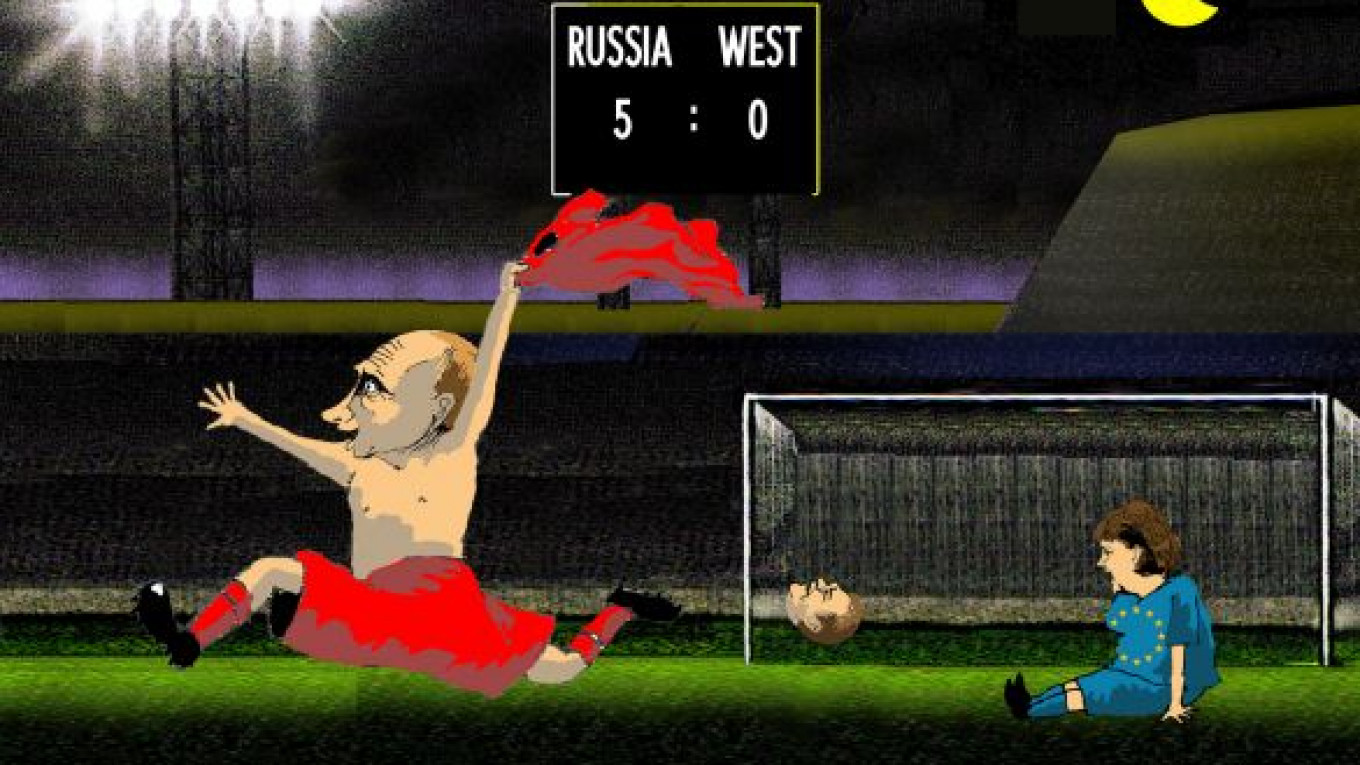Russia's battle for Ukraine has topped headlines in recent weeks and months, and that struggle now nears an end. Kiev did not sign an association agreement with the European Union at its summit in Vilnius last week. That means President Vladimir Putin has scored a huge victory against the West.
It remains unclear exactly which magic words Putin used to convince Ukrainian President Viktor Yanukovych not to sign the EU agreement, but he apparently promised Yanukovych billions of dollars in low-interest loans that he desperately needs to improve Ukraine's economy and strengthen his own chances for re-election in 16 months.
Moscow has taken a strong lead in this year's geopolitical game of Russia vs. the U.S. Here are the highlights of the match so far:
Washington fails to prevent Russia from granting asylum to U.S. National Security Agency intelligence leaker Edward Snowden. Score: Russia 1, USA 0.
Russia all but forces the U.S., Britain and France to abandon plans for military action against Syria. Russia 2, USA 0.
Russia disrupts plans by the EU to sign the Association Agreement with Armenia, while convincing Yerevan to join the Customs Union with Russia instead. Russia 3, USA 0.
The U.S. edition of Forbes magazine names Putin the most influential politician in the world, surpassing U.S. President Barack Obama. Russia 4, USA 0.
Finally, Moscow wages an unprecedented campaign of pressure against Ukraine, ultimately persuading Yanukovych to cancel plans to sign the Association Agreement with the EU. Russia 5, USA 0. If this were a soccer match, it would be a complete rout.
As Putin likes to say, "The weak get beaten." U.S. President Barack Obama, as many had long suspected, turned out to be weak, and he was beaten. Europe has taken a licking as well. The EU was weakened by the economic crisis and became torn by divisions within the union. Brussels revealed its weakness during the Snowden incident, the showdown over Syria, and now in the situation with Ukraine.
The EU never had proper tactics, much less a strategy concerning Ukraine. One of the European leaders tried to convince the others to remove the requirement that Yanukovych release his arch-rival, former Prime Minister Yulia Tymoshenko, as a precondition for signing the Association Agreement with Brussels. Meanwhile, an opposing camp of EU leaders adamantly insisted that no further progress with Ukraine was possible until Tymoshenko was freed.
In public, Western diplomats in Kiev "expressed concern" about the selective justice applied in the Tymoshenko case, but in confidential talks they cynically argued that, for example, German Chancellor Angela Merkel could not afford to risk raising Putin's ire over her attempts to facilitate closer relations between Brussels and Kiev. She understood all too well that Putin could create serious problems for German businesses that have billions of dollars invested in Russia.
At the same time, the EU pompously declared its desire to help Ukraine implement European-style reforms and introduce its Western standards and values, while never admitting that they were primarily motivated by geopolitical considerations. For months, if not years, the talks on closer economic ties between Kiev and the EU never went anywhere. Only at the beginning of the year, when Brussels realized that the anti-Western bias in Russia's foreign policy was reaching a new peak and it started to fear that Ukraine might once again fall under Russia's influence, Europeans hurriedly closed ranks and tried to play catch-up in its bid for Ukraine.
It is surprising that the EU was so completely unprepared for the way Moscow played hardball in the struggle for Ukraine.
It seems that the Europeans were also surprised to discover that Ukraine had never been as interested in signing the Association Agreement as it had led Brussels to believe. Only a handful of European politicians understood that Ukrainian leaders' solemn assurances of their commitment to European integration should be taken with a grain of salt and that the whole thing was a game of political poker in which every player was bluffing.
According to informed sources, Moscow originally placed strict conditions on Kiev and demanded that Ukraine join Russia's Customs Union, which Yanukovych rejected. But at the last moment, Moscow sweetened the deal, not only offering generous financial assistance for Ukraine, but also dropping its ultimatum that it must join the Customs Union as part of the deal. In the end, Russia thought it had won simply by spoiling the game for the EU, denying Europe the chance to claim its "Ukrainian prize."
But the huge turnout of protesters in Kiev — and the subsequently harsh crackdown by the police against them — completely changed the political situation for Yanukovych, Putin and all of Ukraine. The current political instability in Kiev undoubtedly rivals the 2004 crisis, which led to the Orange Revolution. Putin's seeming victory in convincing Yanukovych to rebuff the EU is looking more Pyrrhic with each passing day as an increasing number of Ukrainians express their anger at Yanukovych's decision to table the agreement with the EU.
If the Ukrainian crisis escalates, it could further destabilize this country of nearly 50 million people located in the center of Europe and present a far more urgent challenge for Europe and for its security.
Yevgeny Kiselyov is a political analyst and television journalist.
A Message from The Moscow Times:
Dear readers,
We are facing unprecedented challenges. Russia's Prosecutor General's Office has designated The Moscow Times as an "undesirable" organization, criminalizing our work and putting our staff at risk of prosecution. This follows our earlier unjust labeling as a "foreign agent."
These actions are direct attempts to silence independent journalism in Russia. The authorities claim our work "discredits the decisions of the Russian leadership." We see things differently: we strive to provide accurate, unbiased reporting on Russia.
We, the journalists of The Moscow Times, refuse to be silenced. But to continue our work, we need your help.
Your support, no matter how small, makes a world of difference. If you can, please support us monthly starting from just $2. It's quick to set up, and every contribution makes a significant impact.
By supporting The Moscow Times, you're defending open, independent journalism in the face of repression. Thank you for standing with us.
Remind me later.







